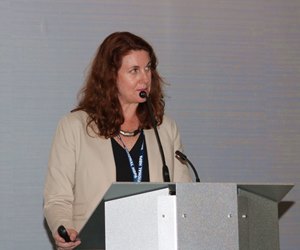Expert: Fixed-Odds Wagering Can Work for U.S. Racing


A wagering expert believes the fixed-odds model could work for United States racing, and with a number of states welcoming sports wagering, the timing has never been better to pursue such a model.
Speaking at the National Horsemen's Benevolent and Protective Association convention March 13 in Clearwater Beach, Fla., consultant Michele Fischer outlined how fixed-odds wagering can work for U.S. racing but emphasized the importance of getting an agreement in place from the start that works for all parties: the bookmaker, gamblers, horsemen, and racetracks.
Historically, pari-mutuel wagering has been conducted on U.S. races. In this form of wagering, all money goes into an individual pool, a percentage of money is collected from that pool largely to pay purses and tracks, and the rest of the money is awarded to bettors. The amount of money wagered into the pool on each entry determines its odds.
In the fixed-odds model, a bookmaker—or even a racetrack—assigns odds to win for each horse. When a bettor makes a bet, those wagers are locked in for the race.
Fischer pointed to Australia as a model where fixed odds are working. In Australia, the fastest-growing segment in race wagering is in fixed odds. From 2012-2017, fixed-odds wagering on Australian racing nearly doubled, helping generate a 24% increase in purses to AU$604 million.
That said, in Great Britain, where most of the money is wagered through bookmakers at fixed odds, Fischer said the model isn't working for the sport. Fischer traces the differences in outcome to the agreements in place.
"Australia is a really good model on how fixed-odds wagering and pari-mutuel wagering can live together," Fischer said. "It can work, but it's predicated on the economic model between the racetracks, racing authorities, and the (government) authorities."
Fischer said tracks and horsemen have to understand that a much smaller takeout is needed for fixed-odds wagering to be attractive to players and bookmakers. But racing has to make sure it gets a large enough slice of this handle to support tracks and horsemen (purses). She cited the Australian agreement as a good model.
"(The percentage to racing) is a sliding scale depending on the quality of the race—based on purse level, anywhere from 2.5% of turnover to 3.5% to 4%," Fischer said.
While that percentage is much smaller than the 20% range takeout for pari-mutuel racing, the sport would receive an opportunity for added distribution—for instance, in outlets and online sites that offer sports wagering; innovative bets, like selecting the favorite or the field, or combining a race bet with a football game; and the ability to offer wagers for a longer time, with bookmakers taking wagers on a race as soon as entries are announced or offering future wagers well in advance of major races.
National HBPA CEO Eric Hamelback said he liked what Monmouth Park, which began offering sports wagers last year and some limited fixed-odds wagering on races, did on Haskell Day last year when offered a parlay bet on two stakes races and a baseball game. Hamelback said such offerings have real potential to spur sports bettors to give racing a look.
Also, while win bets may shift from pari-mutuel pools to fixed-odds pools, wagers like trifectas, superfectas, pick 3s, and pick 4s still work better in the pari-mutuel model and would still be supported and could even grow as fixed-odds wagering generates increased interest.
In what Fischer acknowledged would be a more radical approach, tracks could cut out bookmakers and offer their own fixed-odds wagering. She said there are reliable computer algorithms available that would allow racing to accomplish this.
As more states add sports wagering, Fischer said now is an excellent time for racing to take action. She noted that eight different Atlantic City, N.J., casinos once offered pari-mutuel wagering on horse racing, but that has dwindled to one. She said now that these casinos are offering sports wagering, they want to regain pari-mutuel race wagering licenses to allow sports bettors more options.
Fischer said that as new brick and mortar outlets and online sites begin to offer sports wagering, they are going to desire more wagering events—and horse racing can fill that need. And if race betting is offered as a fixed-odds proposition, it would be easier to understand for sports bettors. Beyond that, as states consider legislation to allow sports betting, it's an excellent time for racing to include a fixed-odds model that lawmakers can approve as they take action on other gaming issues.
As a cautionary tale, Fischer noted that if U.S. racing doesn't make itself available to emerging sportsbooks in the U.S., those books could cut agreements with overseas tracks.
As sports wagering comes online, Fischer said U.S. racing needs to take action.
"Is it a threat to racing, or can it complement racing? We seem to be waiting to find out," Fischer said. "We need to position it to our advantage. We need to move, not wait."
